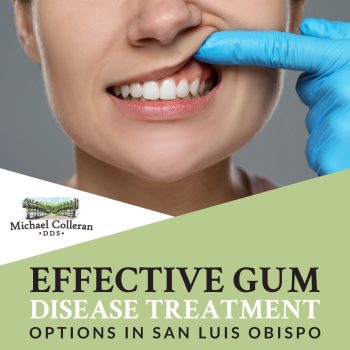Blog

Effective Gum Disease Treatment Options in San Luis Obispo
 What is Gum Disease?
What is Gum Disease?
Gum disease, also known as periodontal disease, is a bacterial infection affecting the gums and surrounding tissues. It often begins with gingivitis, a mild form of gum inflammation caused by plaque buildup. If left untreated, gingivitis can progress into more severe stages of gum disease, leading to significant oral health problems, such as receding gums and tooth loss. “Early detection and treatment are key to preventing poor outcomes and restoring gum health–which is very important to systemic health,” says Dr. Michael Colleran. “This is why we’re serious about treating gum disease in San Luis Obispo.”
Common Symptoms of Gum Disease
The more attentive you are to your oral health, the more likely you are to notice the signs of gum disease before it progresses to loose teeth or tooth loss. It’s critically important to visit Dr. Colleran for gum disease treatment as soon as you notice any symptoms.
Bleeding Gums
One of the most common early signs of gum disease is bleeding gums, especially when brushing or flossing. This bleeding occurs due to inflammation caused by the presence of bacteria and plaque along the gumline.
Bad Breath and Swollen Gums
Persistent bad breath and swollen gums are indicators of advancing gum disease. As the infection worsens, it can cause swelling, tenderness, and the production of foul-smelling bacteria in the mouth, leading to chronic bad breath.
Receding Gums and Loose Teeth
As gum disease progresses, gums can begin to recede, exposing more of the tooth’s root. This gum recession weakens the structural support of the teeth, which can eventually lead to loose teeth and even tooth loss in severe cases.
The Connection Between Gum Disease and Systemic Health
Gum disease doesn’t just affect your mouth—it can have serious implications for your overall health. Studies have shown links between periodontal disease and systemic conditions like heart disease, diabetes, and even stroke. Inflammation from gum disease can spread through the bloodstream, potentially exacerbating issues in other parts of the body. Maintaining good oral hygiene and seeing us early for gum disease treatment in San Luis Obispo is crucial for protecting your oral and overall health.
Gum Disease Treatment Options in San Luis Obispo
Scaling and Root Planing
Scaling and root planing is a deep cleaning procedure designed to remove plaque and tartar from below the gum line. This treatment is essential for promoting gum healing and preventing further damage caused by bacteria. In moderate cases, scaling and root planing is a cornerstone of gum disease treatment.
Laser Gum Therapy
Laser gum therapy is a modern, minimally invasive option for treating periodontal disease. Often referred to as LANAP® (Laser-Assisted New Attachment Procedure), it uses advanced laser technology to target and remove infected gum tissue while leaving healthy tissue intact. This laser gum treatment offers a faster healing time, reduced discomfort, and less bleeding compared to traditional methods.
Antibiotic Treatments
Sometimes, localized antibiotics are used along with scaling and root planing or laser gum treatment to reduce bacterial infection in the gums. These antibiotics are placed directly into gum pockets to help control and eliminate harmful bacteria, speeding up the healing process.
Periodontal Surgery
For advanced stages of gum disease with severe bone loss or advanced gum recession, non-surgical treatments are sometimes ineffective. In these cases, traditional periodontal surgery may be necessary. This allows for more thorough cleaning of deep gum pockets and can help regenerate lost bone and tissue to reverse periodontal disease.
Preventing Gum Disease
While gum disease can lead to severe symptoms like tooth loss and systemic health effects, it is easily prevented with proper care.
Regular Dental Cleanings
Regular dental cleanings are crucial in preventing gum disease. When you visit the dentist for professional cleanings at least twice a year, the plaque and tartar buildup that leads to gum inflammation can be effectively removed before it causes more serious problems.
Proper Oral Hygiene
Maintaining proper oral hygiene is one of the best ways to prevent gum disease. This includes brushing twice a day, flossing daily, and using an antibacterial mouthwash to reduce plaque buildup and keep gums healthy.
Healthy Diet and Lifestyle
A balanced diet and healthy lifestyle choices can also play a significant role in preventing gum disease. Avoiding tobacco products and maintaining a diet rich in vitamins and minerals that promote gum health can reduce your risk of developing periodontal disease.
Why Choose Michael Colleran, DDS, for Gum Disease Treatment in San Luis Obispo?
At Michael Colleran, DDS, we provide gum disease treatment prioritizing your comfort and comprehensive care. We use advanced tools such as laser therapy and digital imaging to precisely diagnose and effectively treat your gum disease. Whether you’re experiencing early signs of gingivitis or more advanced periodontal disease, we tailor your treatment to meet your specific needs and restore your oral health.
“We are proud to be using LANAP, a more patient-friendly alternative to traditional gum surgery, says Dr. Colleran. “It’s a procedure that uses laser technology, offering a less invasive and more precise treatment option. LANAP targets and eliminates the diseased gum tissue while leaving healthy tissue intact.”
Schedule a Consultation for Gum Disease Treatment in San Luis Obispo
If you’re experiencing symptoms of gum disease or are looking for ways to prevent it, schedule a consultation at Michael Colleran DDS today. Our team will perform a thorough examination and create a customized gum disease treatment plan to help you regain a healthy, confident smile. Don’t wait until gum disease becomes severe—take control of your gum health today!
Disclaimer: The content of this blog is not intended to be a substitute for professional medical advice, diagnosis, or treatment. Always seek the advice of qualified health providers with questions you may have regarding medical conditions.










